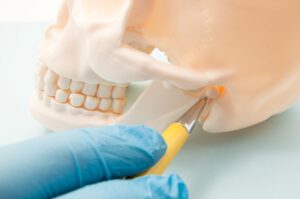The Connection Between TMJ and Sleep Apnea
May 9, 2024
 Do you suffer from chronic jaw pain? Maybe you’re struggling to feel well-rested? Although poor sleep quality and jaw problems may not seem related, researchers have found a link between TMJ disorders and sleep apnea. Disorders of your temporomandibular joints (TMJ) can affect your quality of life negatively. However, they can also put you at risk of life-threatening complications if sleep apnea develops. Here’s why you shouldn’t ignore chronic snoring if you have jaw problems.
Do you suffer from chronic jaw pain? Maybe you’re struggling to feel well-rested? Although poor sleep quality and jaw problems may not seem related, researchers have found a link between TMJ disorders and sleep apnea. Disorders of your temporomandibular joints (TMJ) can affect your quality of life negatively. However, they can also put you at risk of life-threatening complications if sleep apnea develops. Here’s why you shouldn’t ignore chronic snoring if you have jaw problems.
What is a TMJ Disorder?
Your temporomandibular joints are located just in front of your ears, connecting your lower jaw to your skull. It allows you to open and close your mouth and make other movements. Inflammation within the joint can cause it to function incorrectly. You may experience clicking, popping, or grating sensations when opening and closing your mouth. Your jaw may even lock into an open or closed position. Headaches, facial pain, teeth grinding, and ringing in the ears are also common symptoms of a TMJ disorder.
What is Sleep Apnea?
Obstructive sleep apnea (OSA) is a breathing disorder. An obstruction is created in the upper airway from the tongue or tissues in the back of your mouth collapsing while you sleep. This can cause hundreds of breathing disruptions, with each event potentially lasting for a minute or longer.
Each breathing disturbance interrupts your sleep cycle. Over time, sleep deprivation can occur, increasing your risk of mood changes, cognitive decline, memory loss, and much more. Every time you stop breathing, your body is also deprived of oxygen, which can lead to several serious health issues with no treatment, including an increased risk of heart attacks and strokes.
TMJ Disorders and Sleep Apnea
TMJ disorders can be caused by several factors, but a bad bite is a common culprit. Overbites, underbites, and crossbites can cause the jaw to rest in an unhealthy position. This can lead to obstructions of the airway.
Not only can TMJ heighten your risk of sleep apnea, but the breathing disorder can also lead to jaw pain. TMJ problems can occur from teeth grinding as you attempt to open your airway.
Benefits of an Oral Appliance
An oral appliance can treat TMJ disorders, obstructive sleep apnea, and teeth grinding. The custom-fit device moves your jaw into a more comfortable position to prevent airway obstructions. This can stop pauses in breathing in patients with mild-to-moderate OSA.
It also takes the pressure off your TMJs to improve jaw functions. The device creates a protective barrier between the upper and lower arches to absorb the friction and pressure of teeth grinding. This will save your teeth from damage and further alleviate your jaw pain.
An oral appliance is a simple and effective solution to improve your sleep quality, health, and overall wellness to feel your best.
About Dr. Ronan Freyne
Dr. Freyne is a graduate of the University of Medicine and Dentistry of New Jersey and has continued his training in various specialties, including TMJ disorders, bruxism, and sleep apnea. He is affiliated with several professional organizations, including the American Dental Association. Request an appointment through his website or call his office at (240) 800-1429.
No Comments
No comments yet.
RSS feed for comments on this post.
Sorry, the comment form is closed at this time.
